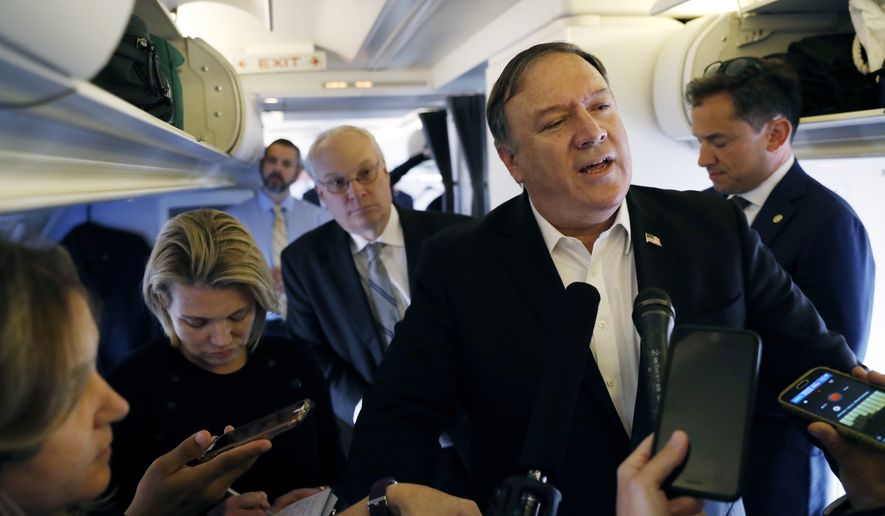NETIVOT, Israel — The Trump administration announced Thursday it will merge its diplomatic mission to Palestinians in Jerusalem under the umbrella of the U.S. Embassy to Israel, a move billed as a bureaucratic efficiency but quickly denounced by Palestinians as a de facto downgrade shifting U.S. policy even farther away from neutrality in the conflict between Israelis and Palestinians.
The U.S. Consulate in Jerusalem worked independently for nearly a quarter of a century from the embassy, which Mr. Trump just relocated from Tel Aviv to Jerusalem earlier this year. The consulate was primarily responsible for outreach to the Palestinian Authority and coordinating U.S. aid programs for Palestinians in Jerusalem, the West Bank and Gaza.
The move was “driven by our global efforts to improve the efficiency and effectiveness of our operations,” Secretary of State Mike Pompeo said in a statement Thursday. It comes close on the heels of a U.S. announcement last month that it was ending funding to the main U.N. agency funding welfare and social programs for Palestinian refugees, calling its operations “irredeemably flawed” and saying Arab nations should be picking up the tab.
The new merger will be led by U.S. Ambassador David Friedman, who had earlier pushed for more authority over the consulate’s mission. The consulate staff and work will be folded into a new “Palestinian Affairs” unit inside the embassy.
Mr. Pompeo insisted that the move doesn’t signal a change in U.S. policy on Jerusalem, the West Bank or the Gaza Strip, nor affect so-called final status issues that include how Israelis and Palestinians divide up control of Jerusalem as part of any final peace deal.
But Michael Oren, Israel’s deputy Cabinet minister for public diplomacy and former ambassador to the U.S., hailed the move as a signal Washington was backing full Israeli control of the divided city even as President Trump and White House adviser and presidential son-in-law Jared Kushner prepare to unveil a long-promised Middle East peace plan.
“A great day for Israel, Jerusalem, and the United States,” the former ambassador wrote on Twitter. Mr. Pompeo’s move “ends the last vestige of American support for the city’s division. Israel is deeply grateful.”
A great day for Israel, Jerusalem, and the United States. SoS Pompeo’s announcement closing the U.S. consulate in Jerusalem and transferring its responsibilities to the embassy ends the last vestige of American support for the city’s division. Israel is deeply grateful.
— Michael Oren (@DrMichaelOren) October 18, 2018
Palestinian Authority representatives slammed the move Thursday, saying it effectively severs the last open lines of communication with the U.S. administration, preemptively decides issues meant to be worked out in negotiations, and shows further bias toward Israel.
Secretary General for the Palestine Liberation Organization Saeb Erekat, long the lead negotiator in peace talks with Israel and the U.S., denounced the move as an example of the U.S. abandoning the two-state solution and effectively endorsing a “Greater Israel.”
Statement by PLO Secretary General Dr. Saeb Erekat on US Decision regarding the US Consulate of #Jerusalem #Palestine
— Palestine PLO-NAD (@nadplo) October 18, 2018
“The U.S. administration has fully endorsed the Israeli narrative, including on Jerusalem, refugees and settlements,” he said in a statement.
Saying the U.S. no longer has a credible role as a neutral arbiter, he added, “The Trump administration is part of the problem, not part of the solution.”
Nabil Shaath, international affairs adviser to Palestinian President Mahmoud Abbas, told the Associated Press that Mr. Trump “is cutting the last connection he is said to have with the Palestinian people.”
“This decision has nothing to do with peace. It complicates peace and makes it impossible,” Mr. Shaath said
In the face of intense international opposition, the Trump Administration announced in December recognition of Jerusalem as the capital of Israel and revealed plans to move the embassy from Tel Aviv. While the White House stressed that this didn’t preclude parts of Jerusalem as a capital for any future Palestinian State, President Trump later wrote on Twitter that the status of Jerusalem, “the toughest part of the negotiation, [is] off the table.”
The Palestinian Authority cut off communication with the Trump administration shortly following the embassy decision in December 2017 and in September, the U.S. closed the PA mission in District of Columbia, citing Palestinian refusal to participate in peace talks.
⦁ This report was based in part on wire service reports.
• Laura Kelly can be reached at lkelly@washingtontimes.com.




Please read our comment policy before commenting.